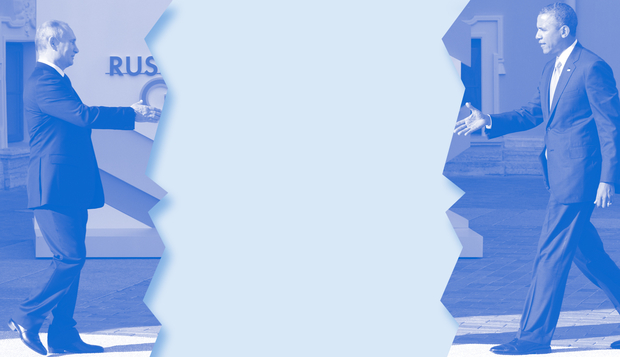
 On his way to the Group of 20 summit in St. Petersburg, Russia, this week, President Barack Obama said relations between the U.S. and Russia had merely "hit a wall.” His message -- that this isn’t a big deal, don’t panic -- was clear.
On his way to the Group of 20 summit in St. Petersburg, Russia, this week, President Barack Obama said relations between the U.S. and Russia had merely "hit a wall.” His message -- that this isn’t a big deal, don’t panic -- was clear.Obama is mainly right. The so-called reset with Russia, which he began in order to soothe strained relations after the 2008 Russian-Georgian war, served its purpose but is now dead and buried. At the same time, the gladiatorial, Cold War-era framework of the U.S.-Russian relationship, based on two superpowers meeting at summits to decide the fate of the world, is an anachronism.
What needs to happen now is that the U.S. and Russia settle into a nice, stable, transactional relationship. Both Obama and Russian President Vladimir Putin seem to realize this -- but they’re having trouble getting there.
Obama not only canceled a planned bilateral summit with Putin, but also belittled his counterpart, talking last month about his "slouch, looking like the bored kid in the back of the classroom.” That kind of language suggests the White House has become careless about what remains a sensitive relationship; Putin, famously, doesn’t forget personal slights. The seating chart for the G-20 was even rearranged so that the two men will be about as far apart as possible. There’s no upside to such poor diplomacy.
Some have suggested that Russia has become "irrelevant” to the U.S.: On Iran and Syria, Putin won’t cooperate any further, nor probably on arms control, and he certainly won’t hand over National Security Agency leaker Edward Snowden. So why schedule empty summits at which the two men will just spar and stare at the floor, as they did when they met in June? Besides, Putin’s crackdowns against political opponents make him a somewhat toxic public figure and require a response.
One reason to keep talking is that Russia still has about 4,500 nuclear warheads, more than 1,000 of them deployed, and a vastness that spreads its interests from Europe to the Far East-- just ask Poland, Georgia or Japan why Russia matters. It is also the world’s second-largestarms exporter. This isn’t the Cold War, but the U.S. and Russia still need a functioning relationship to make sure that surprises (such as the joint U.S.-Israel missile test this week) don’t take on a life of their own.
A second reason is that while the U.S. doesn’t need Russia as a friend, or vice versa, it shouldn’t want Putin as an enemy.
Russia’s president is unlikely to strike out at the U.S. in ways that hurt his own interests -- for example, by cutting off the U.S.’s supply routes to its remaining troops in Afghanistan, a country where instability has more potential to hurt Russia than the U.S. But Putin could supply sophisticated S-300 antiaircraft weapons to Syria, as he recently threatened, and he could also supply them to Iran, severely complicating any future Israeli or U.S. airstrikes. Russia had contracted to sell the systems to both countries but has held back delivery in response to international pressure. For its part, the U.S. can help Russia most by waiting out Putin’s anti-Western shift and avoiding any contest between Congress and the White House to show who can put more pressure on the Kremlin.
Longtime Russia-watchers say the personal relationship between Putin and Obama is now the worst of any between the nations’ two leaders since the fall of communism. The two presidents need to ensure that the deterioration doesn’t spread further. In St. Petersburg, they may not need to kiss, but they do need to make up.



_jpg/250px-ElbeDay1945_(NARA_ww2-121).jpg)






